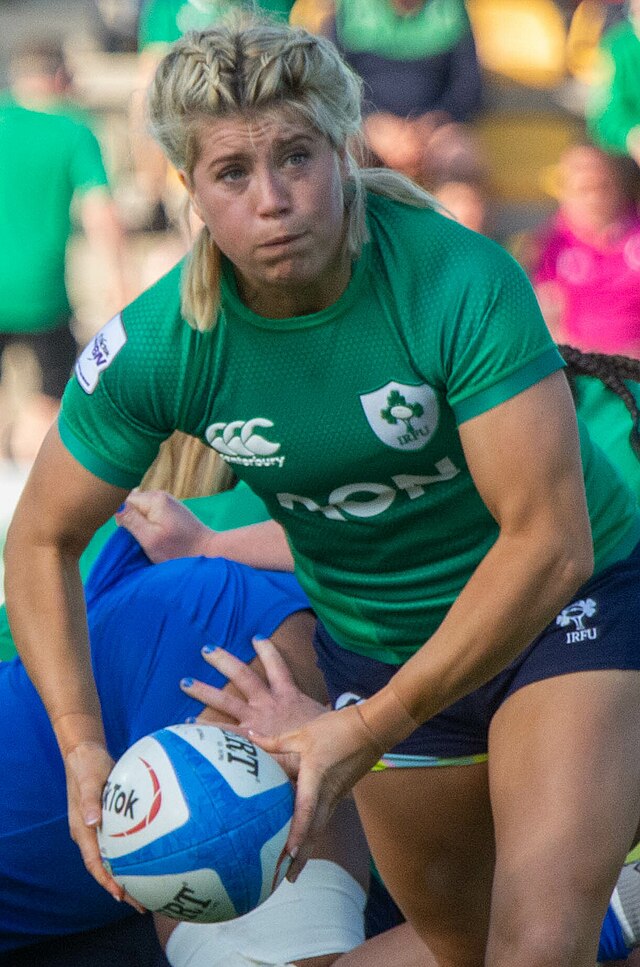Women’s sport is an essential area for Trinity, for Ireland, and honestly the world. As one of Ireland’s most beloved sports, rugby is part of the very fabric of this country – bringing together thousands on game days, freezing school side lines, or cuddled round the TV … usually with a pint in hand! I do believe it is no overstatement to say that rugby is, in its most pure form, a pillar of Irish social culture.
The issue is, many seem to think this only applies to the men’s team – an ignorant, and short-sighted mindset, for those who clearly care little for the true prowess of the sport.
Women in sport are taking back the power, and proving that professional athletes look like women – particularly in the recent rugby world – an overwhelmingly male dominated sphere.This is exemplified by idols such as Eve Higgins and Dannah O’Brien, who inspire girls around the world.
Women’s rugby teams across Ireland have seen significant growth both at grassroots and elite levels. High profile success has been achieved through fabulous victories such as the win in the Six Nations Grand Slam in 2013, and strong performances in more recent tournaments. Coupled with increased media coverage, like Lidl’s “Get Behind the Fight” movement, has promoted essential attention to the sport and projected these champions into our homes – inspiring from the inside out.
Development programs led by the likes of the Irish Rugby Football Union (IRFU), have also been essential for a growth in popularity. For example, the “Give It A Try” movement: an eight week program, run in 80 selected clubs across the country, aimed at teaching rugby in a light-hearted and welcoming environment, specifically for eight to fourteen year olds. This initiative is in its seventh year, and proudly watches some of their previous members who are now playing at Interpro levels, both in the U18 and Senior teams.
Despite growing popularity, challenges persist: from underfunding to relentless gender biases.
A Lidl funded survey exposed some shocking statistics:
A whopping 60% of Irish people have never attended a female sports event, and even more staggeringly 59% of the population said they would rather watch a men’s match on TV, then attend a live women’s match. Almost half the country think male sports are played at a higher level, perceiving women’s sport to be less competitive
and exciting, with over a third believing the standard of play simply does not justify the price of a ticket for live attendance.
The overview ends with the line: ‘…perceptions and unconscious bias around women’ sport in Ireland continue to be key barriers.’ While of course true, there is something particularly irking in letting off a collection of sexist, and outdated stereotypes as ‘unconscious’ – there comes a point, when this simply cannot cut it as an excuse. The research has illuminated the damage of said, ‘unconscious’ bias, unambiguously laying out the facts. Stop being lazy, check your unconscious, force it into your mind, and think more carefully. As LFGA President, Mícheál Naughton, said, “The findings are certainly revealing and it’s now incumbent on people to get behind the fight…”
Underfunding and lack of resources continues to damage the level at which women’s teams are run, which is both depressing and inexcusable. This is in particular comparison to the more than generously endowed men’s teams, who enjoy a plethora of coaching, facilities, and personal player development. There is not the same level of professionalism assumed for the women’s teams. More specifically for the youth intake: boys are encouraged to think “professional rugby player’ is both a normal” and exciting professional prospect, while girls are allowed to believe it’s an unrealistic and unexpected path for them. As a result, standards are not held as high amongst young female teams, and retention issues lead to a competitive gap. The most obvious example of this is Ireland struggling to keep up with fully professional sides from nations such as England, France and New Zealand.
In its most crude form, progress can be tracked through an observation of salaries amongst the various teams within Ireland and abroad. Male Irish rugby players, average a fee of €60,000 per year – with sums as much as €500,000 not being out of the norm. This is a combination of provincial contracts, and national team earnings. Additionally, players such as this year’s Six Nations captain, Peter O’Mahony, will have received a hefty bonus for his performance. In comparison, salaries for Edel McMahon and Sam Monaghan – Ireland’s female Six Nations co-captains this year, sit between €15,000 and €30,000 and are only potentially estimated to reach €45,000 with match fees and bonus. This humiliating difference is not confined to Ireland. England’s Red Roses reported a ‘landmark deal with the RFU’ which could see some of the top women earning up to £63,500. While a wonderful development, the success stings when you realise their male counterparts are raking in around £160,000. In terms of match fees – the male standard for top players in England is £23,000, while the women’s team were paid only £400 earlier this year. Evidently the rot is not just an issue for Ireland.
Unfortunately, the teams keep real details about their fees under wraps, as they throw out vague comments about ‘confidentiality’, and ‘commercially sensitive’ buzzwords to avoid delving into the gross inequality at play. Unanswered calls for transparency resulted in a public letter from current and former Irish female players, demanding recognition and justice: “We write in the wake of a series of recent disappointments for the international team, on and off the field, but ultimately recent events simply reflect multiple cycles of substandard commitment from the union, inequitable and untrustworthy leadership, a lack of transparency in the governance and operation of the women’s game both domestically and at international level, and an overall total lack of ambition about what it could achieve.”
Greater equality of pay, and funding to provide professional contracts, facilities, and consistently high-performance programs are the much needed next steps to a more equal future in rugby. Continued focus on the grassroots development programs, exposure in schools, and sustained support for upwards mobility are needed as well. With this, we hope mindsets will change and the idea of a professional woman in rugby will be both encouraged and taken as read. On the ground this is down to coaches, and forward-thinking professionals who are prepared to grow the overall infrastructure of the game. However, real change begins with you. What you think in the comfort of your own home, when you think no one’s watching, is a truer representation of feeling, and a greater imparter of change: let’s change the statistics.
Sadly, the Women’s Rugby team at Trinity did not comment. However, they continue to grow in popularity. Matches to watch and show you support will be posted on their Instagram, so keep up to date!







